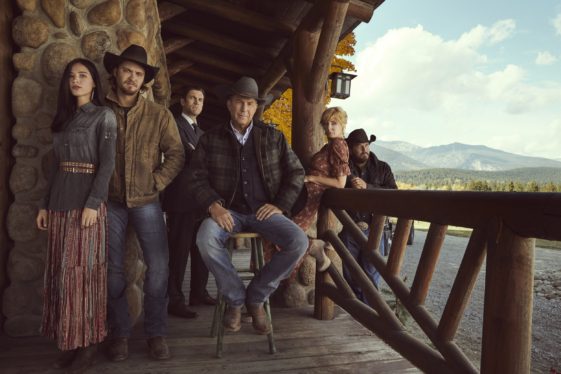The modern country music business is putting a little of the western back into country & western.
The C&W phrase was dismissed years ago: The Recording Academy dropped “Western” from its category names in conjunction with the 1968 Grammy Awards, and the Academy of Country Music snipped the “& Western” from its organizational banner in October 1973. But there is a noticeable western resurgence taking place.
Former rodeo pro Cody Johnson is becoming a consistent trophy-winner, Jon Pardi and Midland represent western fashion and attitudes, and Dierks Bentley draws frequently on his Arizona roots for storylines that reflect the atmospheric heritage of his home state and regional sister Colorado. Extending the trend, Wyoming native Ian Munsick’s second Warner Music Nashville album, White Buffalo, incorporates lonesome steel, cowboy imagery and Amerind-flecked musical grounding.
“A lot of people still view cowboys and Native Americans as enemies because that’s what Hollywood has shown us over the years,” Munsick notes. “But they live hand in hand and they’re actually the same people, so there’s a lot of Native American influences on my album.”
Lainey Wilson is particularly bringing the West to life with her current single, “Heart Like a Truck,” which won a CMT Award on April 2 for its horse-themed video, while the song is also featured in a horsepower-themed Ram Trucks commercial. Given her role in the Paramount+ series Yellowstone, it’s no surprise that Wilson sees that series as a strong driver in the trend.
“I don’t know why western ever went out of style to begin with,” she says.
For years, the cowboy was a dominant figure in entertainment. Roy Rogers, Gene Autry, Tex Ritter, Rex Allen and The Sons of the Pioneers were among the singing cowboys who kept the tumbleweeds rolling on the silver screen. Even when western vocalizing fell out of favor, cowboy dramas remained plentiful on the big screen and on TV, where over 100 westerns landed on network schedules in the ’50s and ’60s, including Gunsmoke, Big Valley, Rawhide and The Cisco Kid. Marty Robbins kept western tones alive on country radio even after they had left movie theaters, fashioning classic cowboy songs such as “El Paso,” “Big Iron” and “Cowboy in the Continental Suit.”
Miranda Lambert’s Palomino single “If I Was a Cowboy” obliquely referenced him with the phrase “big iron hips.”
“I love westerns, and I’m a huge Marty Robbins fan,” says co-writer Jesse Frasure (“Dirt on My Boots,” “What’s Your Country Song”). “Any of that kind of stuff and those melodies, I’m always a fan of doing.”
Los Angeles’ country/rock movement, which occurred during Robbins’ peak years, likewise threaded cowboy ideals into the Stetson, cactus and “Desperado” themes and images of The Flying Burrito Brothers, Eagles, The Byrds and Poco. That era, which brought an adult viewpoint to the pop and rock music that preceded it, is celebrated in the aptly timed Country Music Hall of Fame and Museum exhibit “Western Edge.”
“They wanted to write songs that were about home, about love, about relationships as modern relationships were at the time,” museum writer-editor Michael McCall says. “They wanted to take it away from the sort of rock’n’roll fantasy stories and make it about real stuff.”
Like those acts, Tanya Tucker sees no-nonsense characters as a major part of western standards. Revealed April 3 as a 2023 Hall of Fame inductee, Tucker counts the cowboy-themed “Texas (When I Die)” and “It’s a Cowboy Lovin’ Night” among her hits, and her next album, Sweet Western Sound, is due June 2.
“I’m into real shit,” she says. “The difference between a cowboy story and a fairy tale is a fairy tale starts out with ‘Once upon a time,’ and to me, a cowboy story starts out with ‘This ain’t no [phony] shit.’”
Unreality is a major function of modern life. The rise of artificial intelligence is just the latest entrant alongside deep fakes, programmed sound and video games — all of which represent some level of virtual mimicry. As a tonic, the physical work and outdoor lifestyle associated with the cowboy are likely a major attraction behind the resurgence of the West.
“I think the further we get into the future, and our society is so reliant on screens and technology, that we really want to go back to the old ways of life,” suggests Munsick. “That’s living under the stars and having free range to roam around in. That’s what the West offers.”
That creates a certain dichotomy in the current trend. Kassi Ashton, who inserted what she calls a “spaghetti western” steel guitar into her single “Drive You Out of My Mind,” sees the cowboy ideal being applied to small-screen social media.
“The trending aesthetic for this summer is coastal cowgirl,” she notes. “That’s all over TikTok, and it’s crazy how trends happen. You get into a whole discussion why. I think that inflation-wise and everyone being broke right now being tied to a Western, simple, coastal, rustic thing is not a coincidence.”
This wave is not likely to inspire country music to reestablish the dated country & western brand. Back in 1980, the genre rode the Urban Cowboy movement for a year or two before it petered out. But it does hint at a reexamination of ideals, both in the arts and in humanity.
In the end, the West is less about the lasso, the six-shooter or the Stetson than it is about integrity and trustworthiness, Wilson maintains. As well as dogged individualism.
“My daddy is a real-life cowboy,” she says. “He stands up for what he believes in. Don’t take no shit.”
Subscribe to Billboard Country Update, the industry’s must-have source for news, charts, analysis and features. Sign up for free delivery every weekend.
https://www.billboard.com/pro/country-western-cowboy-songs-yellowstone-tiktok-trends/




